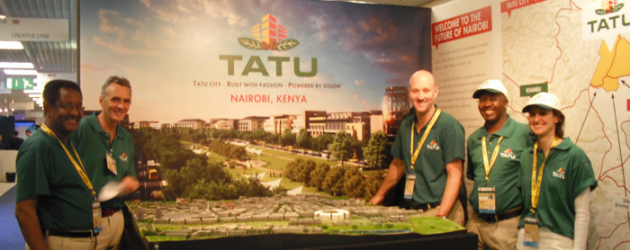Nash Nyagah, Kenya partner with Chris Baxter, Arnold Meyer, Josphat Kinyua and Polina Veksler of Renaissance Partnership admire a model of the new Kenyan city at its global launch at MIPIM in Cannes, France.
by LOUISE NICHOLSON
The first privately funded new city to be built in Kenya in the post colonisation period, Tatu City, was launched last week at MIPIM, the prestigious property conference held annually in Cannes on France’s famous Cote d’Azur.
The 1 000 ha development, which is also the first holistic lifestyle city planned in Africa, will be built in Greater Nairobi in 10 phases, providing much needed housing for 62 000 people, as well as offices and shops which are expected to attract a further 23 000 visitors a day.
Phase one of the new development - which will have its official launch in Nairobi in June - will provide 1 800 entry level residential units. There will also be a 25 000 m2 shopping centre and 80 000 m2 of office space.
Arnold Meyer, managing director of Renaissance Partners, the developer, said Nairobi urgently needs 300 000 new homes. There is an annual shortage alone of 30 000 entry level homes (selling for between US$40 000 - 80 000) but at the moment only 3 000 a year are being built.
Part of the site is a coffee farm and this will continue as a working farm during the development of the new city. Additional land, also currently farmed for coffee, will be added at a later stage.
Thirty-five percent of the initial scheme has been set aside for a natural green belt and will be maintained as wetland. A further 15% is being earmarked for world class infrastructure and schools and hospitals are also on the master plan. There are two universities within 7 km of the development and already the developer is buying up adjoining land for further expansion to take advantage of the increased population and demand for further education, as well as research and development opportunities.
The scheme will save a massive 40% on electricity usage, says Meyer. All warm water in the homes will be solar heated and no air conditioning will be allowed in the office buildings – instead they will have basement chiller rooms that will freeze large ice packs overnight when electricity usage is low. Fans will then blow over this ice to keep the buildings cool during the heat of the day, a technology that has been in use on the African continent for the last decade.
The Tatu City development is partly funded by Renaissance Capital of Moscow and partly by local Kenyan businesspeople. A start will be made on the infrastructure in June, and phase one construction will start later this year. Phase three is scheduled to be finished in 2013.
Members of the professional team are all from South Africa. They include: Frikkie de Lange of DLC town planners; Riana du Plessis, urban planner; Elaine Holtzhausen, of Lokisa Environmental Consulting; E W van Renssen, Leo Consulting Engineers; and Jaksa Barbir, urban designer.

